
Recently on Cyclingnews.com |
An interview with Christophe Moreau, January 16, 2006
Changing perspective
Along with 'Paco' Mancebo, Christophe Moreau is the second leader at the new ProTour squad AG2R, who is licensed to help his team-mate at the Tour de France. But he tells Cyclingnews' Hedwig Kröner, it's an agreement that works both ways.
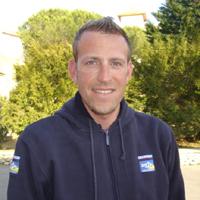
|
Since Christophe Moreau discovered that a little aggressive riding could earn him a stage victory or a even a day in yellow, the 34 year-old has changed his perspective from the eternal first Frenchman on GC to a potential attacker, able to spice up the 2006 Tour de France.
Looking at the press kit with maps and profiles Cyclingnews brought to the interview, Moreau revealed that even the first week of racing could well hold some surprises in this year's Grande Boucle, especially as there will be no true favourite team to take control over the race before the mountains begin. And Moreau is determined to take advantage of that...
Cyclingnews: How did you team change to AG2R come about? During the Tour, things got stirred up with your former team, Crédit Agricole...
Christophe Moreau: Yes. My contract with Crédit Agricole was coming to an end. In principle, my intention was to continue with Crédit Agricole, and the team manager Roger Legeay wanted to wait a little before re-signing me. So I waited, one week into the Tour, two weeks, three weeks... during this time, suddenly, the French sporting press printed that Vinokourov was to come to Crédit Agricole. I didn't know that Legeay's future plan was to continue with another rider instead of me. All I was doing was waiting for an answer - positive or negative.
Legeay never confirmed or denied that he had dealing with Vinokourov, so to this day I don't know if it was even true. Anyway, from that moment on, I understood quickly that I wouldn't ride in this team's colours in 2006, because they had other plans on a strategic and sporting level.
"Legeay and I were communicating via the press; it was clear that it was the end."- Moreau on his departure from Crédit Agricole |
It was hard because there was still one week of racing left at the Tour, but dialogue was practically non-existent and our relation was very tense. Legeay and I were communicating via the press; it was clear that it was the end. I started looking around for other possibilities in France as well as in other European countries; which included AG2R, interested in Vinokourov but also in a French leader - myself - and finally Saunier Duval in Spain. After Vino withdrew from AG2R's offer, that was my choice for several reasons: of course because it is a French team, but also because I know Vincent Lavenu well. [When Moreau became a pro in 1995, he almost signed with Lavenu's former team Chazal, but then turned to Festina - ed.] He was hoping to upgrade to the UCI ProTour by getting a co-leader along with myself if I signed, so even if AG2R wouldn't have been in the ProTour, I as a French leader would have been in a fine French team.
CN: So it was clear that you would be co-leading the team with another rider at the time?
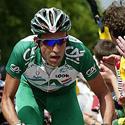
|
CM: Yes, absolutely. He clearly told me that he had someone in mind who finished in a top ten spot at the Tour - I kind of gathered who it was - so I knew that there was a big name coming. Finally, my choice to join AG2R was also influenced by the fact that even if they didn't succeed in getting a ProTour licence, it wouldn't have influenced my approach for the Tour de France much. Nevertheless, it would have been a pity for the team and its sponsor, who's putting a great deal of effort into the squad. Now, I'm very happy because I made a choice that was somewhat risky in the beginning, but which was finally consolidated by the arrival of Mancebo and the upgrade into the ProTour. This new beginning is giving me a lot; the atmosphere in the team is great.
CN: What would have been the difference to a Spanish team?
CM: Well, there was also the factor that a French leader living in Spain would have been perceived differently by the public. It was a question of image, too, and I don't deny that I thought about that. Although I had been with Festina before, this time I had other serious offers so I don't regret anything about my choice.
I also particularly like Vincent's (Lavenu) thinking as to the future of his team, his strategy and vision. It coincides very much with my mentality and character, and that was also important especially as I was committing for two years. It was much more than barely a financial choice.
CN: You probably knew some of the riders already, too.
CM: Yes, I knew practically all the French riders in the team before joining the squad - maybe not the younger ones but I'm getting to know them now, and that's a lot of fun as there's been a great atmosphere also in the first gathering in Temple-sur-Lot, as there is now here in Provence. Mancebo and I know each other well, too; we've been up front together many times in stage races so there is no problem at all.
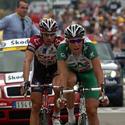
|
CN: Let's come back to last year's Tour de France - you finished 11th overall as best-placed French rider but also had a huge wave of support in France when you were second-placed on GC after stage 9 to Mulhouse.
CM: I took some risks when I jumped on the opportunity in that stage, but that day I realized that this kind of riding could be very rewarding! I almost won the stage, I was second on the yellow and second on the polka dot jersey classifications. Even if the race evolved differently after that - I couldn't get the maillot jaune in Courchevel, and I got third in Briançon, finally ending up in 11th place on GC - I realized that taking this kind of risk in the first week could well lead to a jackpot in terms of results, rather than to focus only on the general classification, as I have done in the past. Moreover, I saw that this kind of experience didn't interfere with my GC hopes at all, and that I could learn skills I didn't know very well: attacking, breaking away, playing a card...
So I was satisfied with what I did at the Tour; I almost took the yellow jersey and that was very rewarding. After that, I had a more difficult time in the Pyrenees, and on top of that there were these problems I had with Crédit Agricole which got my morale down. But looking at it now, I think to myself I can be satisfied with what I've done at the Tour.
CN: What does it mean to you to have finished - again - best Frenchman at the Tour?
"Today, I think my riding style has to be more offensive: there are the stage victories, the yellow jersey or even the polka dot jersey."- On his future goals, especially at the Tour de France |
CM: This position has been my destiny for four or five years now. It's not bad but it's not really what I've been interested in all these years; what I wanted after finishing fourth on GC in 2000, was the podium or at least the yellow jersey for a few days. Today, I think my riding style has to be more offensive: there are the stage victories, the yellow jersey or even the polka dot jersey. I didn't talk about this before, but it's true that I'm thinking about it more and more.
So if Mancebo will be our man for the general classification more than myself at the Tour, I will have responsibilities that I'll assume, but as a co-leader I might be able to do like in Mulhouse: go for the jackpot like the yellow jersey, the stage victory or the polka dot jersey.
Now that I'm not up for a podium spot anymore, I might as well try and get a stage victory - and why not a mountain stage to get some points for the mountains jersey? To collaborate with Paco in the mountains will be very good also because we will share the responsibility, which will also give the team great serenity. I will be there to help him for the GC, but at the same time be able to go out for other things.
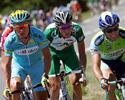
|
CN: So the polka dot jersey could be a goal for you?
CM: That's what I tell myself today. To live up to my responsibility with Paco for his GC placing is not a problem, that's for sure, but we are two leaders and I might be in a better position today to ride aggressively and reach for these goals. Of course two is better than one, also in the mountains!
And there's also a team behind us that is really motivated, because it now has two leaders to ride for, who can really achieve something at the Tour, which it hadn't before.
CN: So the Franco-Spanish connection at AG2R will work?
CM: For sure, because I know I can be a precious ally for him just like he can be for me. This association will be important for our performance, we won't work against each other. This is absolutely clear in my mind, as it is for him. With Vincent (Lavenu), we talked a lot about it a lot, and I think that it will also be something that will settle in as the season unfolds. We will already be together in Cataluña, at the Dauphiné etc. That way, we can practice our interaction for the Tour.
It's also an asset to share the pressure between the two of us - that will give us more tranquillity in our actions. We know each other well, like I've said before, and we definitely want to show that AG2R and Vincent Lavenu have made the right decisions for the ProTour! It's motivation to all of us.
CN: Will the two of you recon some stages together?
CM: Yes. I think the reconnoitring is scheduled between the Vuelta a Cataluña and the Dauphiné Libéré. With some of the Tour de France roster, we will see the key stages in the Alps, as they are more important this year. They will have to mastered in the third week, after the Pyrenees, and they will be hard. Each year, I've always reconnoitred the mountain stages - it's a 'must do' for me. It's good to memorize some climbs, to get the feel for them again, even for the descents! To me it's important to get acquainted with the climbs once again about a month prior to the Tour, as it helps me a lot on the racing day. Once you're going flat out, it's good to have your markers on the route.
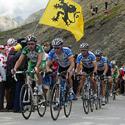
|
CN: So what do you think about the 2006 route, especially the mountains?
CM: (Looking at the 2006 Tour de France map and mountain stage profiles) There are two hard stages in the Pyrenees - especially the one to Pla-de-Beret - and then three beautiful ones in the Alps. Those will be important, they will be hard. As for the Pyrenees, once we reach Gap, that's where it will be happening.
But even stages like the third stage to Valkenburg will be interesting. We will ride through pretty hilly country: Luxembourg, then the roads of Liège-Bastogne-Liège and Amstel Gold Race. Maybe it would be good to take a look at that stage. This year, there won't be any team time trial, which will change some things. The first time trial is in Rennes, in the Bretagne, not too long after that... But even right at the beginning of the race, in Strasbourg, there could be interesting breakaways. It's not too far from where I come from...
CN: So what are your thoughts on this first Tour without Lance Armstrong?
CM: It opens up the race enormously. Will Discovery control the event for somebody else like they did for Armstrong? I'm not sure. Will Basso take the responsibility as future winner of the Tour? Maybe - but when during the race will that happen? Or will it be Ullrich with T-Mobile, Liberty Seguros with Vinokourov? So it will be interesting to see what happens and how these teams will react to any breakaway attempts on these sort of stages. Later on in the mountains, the leader's team will take control over the race and the game will be more clear. But before that happens, there are many possibilities.
In 2001, we had this one stage to Pontarlier where the bunch didn't chase a breakaway at all, coming in over half an hour later. So I think one has to take his chances before the ranking on GC will dictate the face of the race in the mountains. Just as in the Vosges this year, when the classification wasn't made yet - that was a day that could have changed the race very much. Maybe not until Paris, but at least for a few days.
